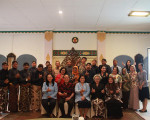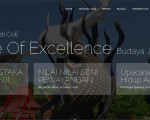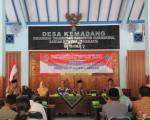Librarians Sertification in
Writer:
Hendrikus Franz Josef, M.Si
Regional Library and Archive Office of
2019
Abstract
The role of libraries as the dissemination and provider of library and information materials requires librarians as one of the resources capable of making active and positive contributions. Recognition of functional positions in the librarian of civil servants does not make private librarians less active and creative in their work. Publication of library standardization as a reference for librarians in their work has made a difference so far. Through librarian certification, librarian competencies are tested regardless of whether they are public or private employees. The existence of the librarian profession is able to answer doubts and insecurities that always interfere with librarians. The benefits of librarian certification are indeed not directly felt by librarians. Because of the status stated in the librarian certification certificate, he can provide added value to other parties who have used library services and products. Librarian certification is able to improve the librarian's self-image as one of the competent professions. Librarian certification is based on, namely: namely: 1. Republic of Indonesia Labor Law No. 13 of 2003; 2. Law of the Republic of Indonesia National Education System Number 20 of 2003: Republic of Indonesia Law Number 43 of 2007; 4. Government Regulation concerning National Professional Certification Agency Number 23 of 2004; 5. Government Regulation concerning the National Work Competency Standardization System Number 5 of 2012; 6. Government Regulation concerning Implementation of Law Number 43 Year 2007, Number 24 Year 2014; 7. Presidential Regulation concerns the Indonesian National Qualification Framework Number 8 of 2012; 9. Regulation of the Minister of Manpower and Transmigration of the Republic of Indonesia concerning the National Work Competency Standardization System; Number 5 of 2012; 10. Regulation of the Minister of Manpower and Transmigration of the
Preface
Librarian certification is often discussed in meetings between librarians both in seminars and work meetings. Librarian certification does have its own appeal for librarians who bring beneficial consequences for them. The predictable advantage of certification is the increase in librarian professionalism and also the increase in welfare in the form of more rewards than before. Government policy in the field of library in the form of Decree of the State Minister for Administrative Reform No. 18 / The minister of empowerment of the State Apparatus / 1988 concerning Librarian Functional Position and Government Policy Revision based on Decree of the minister of empowerment of the State Apparatus No. 132/2002, is an opportunity for the development of librarians as well as positioning the librarian profession in line with other professions.
This allows the librarian to have full capabilities and can achieve the highest career in the library. In addition to enhancing the librarian's career itself, a librarian also has the task of raising his profession so that the public is aware of the presence of the librarian and his role in contributing to the nation's intelligence through the provision of information. In providing information, what is needed is not only money, but also the creativity, talents and intellect of librarians. Creativity is important, and librarians must explore their own creative abilities or potential. This will help them to be more effective in managing information in the library and providing satisfying services to their users, as well as finding new ideas or strategies in improving service quality. Librarian profession development must continue to be pursued, for example by attending librarian education, participating in seminars, workshops, writing, teaching and conducting research that will further enhance the librarian's insight about the field of librarianship.
How To Certify Indonesian Librarians
Certification is a series of activities for the issuance of certificates of the competence of a person or product or service, or the process of an institution's activities that are in accordance with and / or meet the required standards. Certification is the process of awarding a certificate which is carried out systematically and objectively through an assessment of Indonesian and / or international national work. Certification is divided into three, namely: 1. Certification of professional competence: conducted by the Professional Certification Institute and applies if it is still competent. This certificate is valid for the most recent competence (current competence); 2. Certification for obtaining professional status: carried out by professional organizations, also called professional licenses / registration. Sometimes this certification is issued after the person has a certificate of professional competence; and 3. The training certificate given by the training institution, called the certificate of attainment, is valid forever. Certification of librarians who have passed the competency test and passed the certification process, they will be given a certificate in accordance with the competency test that they are undergoing.
The process of awarding librarians has the main objectives for librarians, namely: 1. Give formal recognition (certificates) for the competencies of a librarian according to the standards; 2. Increase the professionalism of librarians, and determine the appropriateness of a librarian's readiness to provide good and correct information services or excellent service (Professional Competency Certification) 3. Eliminating the dichotomy of civil servants and private librarians. Librarians who have received certification will have the same position on the recognition of their abilities, because of the existence of a quality assurance agency.
The purpose of granting librarian certification is to determine the quality of the librarian to the standards set in order to improve the quality of library services, provide quality assurance to the best library services with excellent service, protect and manage library information resources, ensure the ongoing management of the librarian profession properly, guarantee the implementation of the library program, guaranteeing the selection of librarians who meet competency standards, and encourage the improvement of education for the librarian profession.
Professional certification is intended so that activities or a standardized work process are carried out properly and provide the final results as expected because it is carried out by people who have the required competencies. With this certification, if there are a lot of the same work and is carried out in various places by many people but have the same level of competence as required, then it can be expected to give the same results. With professional certification, not only organizations that use the profession get guaranteed results, but also all end users of the organization will get results that can be accounted for in the long term and repeatedly.
Some benefits of librarian certification are: 1. Library users will get good service in quality and quantity of information needs and library materials needed. Llibrarians who have received certificates will certainly have competencies in accordance with their fields of expertise. The community will also get the best treatment because the librarians concerned can be good communicators by providing excellent service; 2. For libraries, helping libraries convince library users about products / services that have been carried out by competent personnel, assisting libraries in the recruitment process and developing competency-based personnel for efficient HR, helping libraries to get competent personnel, and ensuring and increasing the performance of librarians; 3. For Educational and Training Institutions, is to help ensure the link and match between graduates 'competencies and the demands of the librarians' world competencies, ensure the achievement of efficiency in the development of training programs, ensure high education and training achievement, and maintain student competencies during the learning process; 4. For the government is to help ensure the achievement of human resource development programs, the suitability of the guidance and control system of human resources, and the targets of development program planning in the sector; 5. For librarians, it is to help professional staff convince the organization or client that they are competent in working or producing products and services, ensure and maintain competence to increase self-confidence, help in career planning, measure the level of competency achievement, help meet regulatory requirements, assist recognition cross-sector and cross-country competencies, and help the promotion of the librarian profession in the labor market.
In general, the future of certification in
An organization or institution included in this case the library is said to be of quality if the quality of services provided to the public has gained recognition from the community. This quality can be achieved by any library including the university library, by working hard, so that work performance is more optimal. If a university library can provide quality services to the community in its environment, then the librarians and administrative staff in the library are implicitly qualified. With the existence of quality services by college librarians, the goals set by the institution can be achieved.
A good library can be measured by its success in providing quality services to the public. The better the service, the higher the award given to a library, the complete facilities available, the amount of funds provided and the number of librarians, does not mean anything if the library is unable to provide quality services. Therefore, librarians should strive to have quality resources . There is an opinion that says that “Library is Librarian” (Libraries are librarians). This opinion implies that the library is no longer just a place or a physical aspect, but rather an entire activity driven by the librarian. The progress and decline of the library no longer depends on the size of the building and its collection, but depends on the quality of human resources or library staff. Thus, the librarian is one of the resources that drives other resources in the library organization that enables the library to play an optimal role in carrying out its main tasks and functions.
The demand for improving the quality of the performance of the librarian is a logical consequence of the increasingly advanced development of science and information technology, as well as the development of demands for reform in the country, especially for the implementation of the tasks of the state apparatus, including in this case the librarian. The demand for reform is basically the creation of a professional state apparatus in providing services, protection and community empowerment.
Requirements for followinglibrary certification, The requirements that must be met are as follows:
A. Basic Requirements.
a. Minimum Bachelor Degree in Library and Information Science, or
b. Minimum S1 degree in other sciences plus graduated from Expert Level Librarian Candidate training.
c. For prospective participants who will take the Expertise Cluster, they must have been Competent (passed the competency test) in one of the Clusters in the Work field.
d. Considering the financing of certification is borne by the State Budget, we prioritize prospective participants who have the status of librarians both civil servants and private
B. Registration Procedures.
1. Prospective Competency Test Participants fill out and sign the application form (FR-APL-01) and fill in the independent assessment form (FR-APL-02) according to the selected cluster (what units are tested per cluster can be seen in point no 3).
APL-01 FORM is tailored to the cluster you choose
2. Attach complete registration documents:
* Photocopy of proof of Identity / must be the same as FR-APL-01, Section 1.a
* Photocopy of certified diploma // must be the same as FR-APL-01, Section
1.b
* Photocopy of the relevant latest Appointment Decree / Certificate of
employment from the agency (for participants who have worked) // must be
the same as FR-APL-01, Section 1.c (download Sample Certificate of
Working)
* Relevant (original / legalized) Training Certificate // completes FR-APL-01,
Section 1.c, for S1 non-Library Science education
* 2 pieces of 3 X 4 recent photographs
3. Select a cluster (test package) according to the field of work: (filled in Part 2 FORM APL-01)
a. Collection Development, the units to be tested are as follows:
1. General Competence
* Operating a Basic Computer
* Develop a Library Work Plan
* Making a Library Work Report
2. Core Competencies
* Select library materials
* Procurement of library materials
b. Library Material Processing, units to be tested as follows:
1. General Competence
* Operating a Basic Computer
* Develop a Library Work Plan
* Making a Library Work Report
2. Core Competencies
* Do Descriptive Cataloging
* Cataloging the Subject
c. Library user services, units to be tested as follows:
1. General Competence
* Operating a Basic Computer
o Develop a Library Work Plan
o Making a Library Work Report
2. Core Competencies
• Perform Circulation Services
• Conduct Reference Services
• Carry out a Simple Information Search
Library, units to be tested as follows:
1. General Competence
* Operating a Basic Computer
* Develop a Library Work Plan
* Making a Library Work Report
2. Core Competencies
* Conducting Library Promotion
* Conduct Information Literacy Activities
* Utilize the Internet Network for Library Services
e. Basic Library Material Care, units to be tested as follows:
1. General Competence
* Operating a Basic Computer
* Develop a Library Work Plan
* Making a Library Work Report
2. Core Competencies
* Perform library material maintenance
* Improving library materials
f. Field of Defense, to take this unit must pass one of the 4 occupational clusters above. Unit to be tested (choose one):
1. Designing Spatial Planning and Library Furniture
2. Making Secondary Literature
3. Perform complex information searches
4. Making Scientific Writing
5. Conducting a Library Field Study
.
Conclusion
Librarian is one of the professions whose existence is currently starting to attract many people. Like other professions, the presence of librarians is expected to be able to provide positive support in increasing the competitiveness and selling of their parent institutions / institutions. The popularity of the librarian certification is able to increase the position of the librarian and the positive image of the librarian, making the presence of the librarian cannot be underestimated. Librarians are functional workers whose presence is able to provide added value to many parties who have utilized the results of their work. Professional librarians and competencies are librarians who have competitive advantages, in the form of productive and innovative work abilities and skills. Professional librarians are librarians who have a passion for work, and have high loyalty to the institution. The competence of a librarian can be obtained through formal education, training or from work experience. Some defects that can be submitted as a suggestion for readers on efforts to improve the competence of librarians are: 1. Private librarians can enter / adjust their tasks according to the items of activities in the Regulation of the Minister of Administrative Reform. State and Bureaucratic Reform No. 9 of 2014 concerning Librarian Position and Credit Score; 2. Librarians need to follow the certification of librarians as proof that the librarian is able to work professionally, and is able to raise the self-image of the librarian as a functional competent who is very competent in his field.
Bibliography
Fatmawati, Endang, Menanti Sertifikasi Pustakawan, Suara Merdeka, 2012;
Megaminingsih, Tri Lestari. Mengelola Sumber Daya Manusia (SDM) Dalam Upaya Meningkatkan Mutu Layanan di Perpustakaan PerguruanTinggi, Media Informasi, Vol. XIII, No. 3, tahun 1999;
Nashihuddin, Wahid, and Dwi Ridho Aulianto, Strategi Peningkatan Kompetensi dan Profesionalisme Pustakawan di Perpustakaan Khusus, Jurnal Perpustakaan Pertanian 24.2 , 2016; .
Rodin, Rhony, Sertifikasi Uji Kompetensi Sebagai Upaya Peningkatan Profesionalitas dan Eksistensi Pustakawan, Jupiter 14.2, 2015.
Perpustakaan Lainnya
 Sosialisasi Tata Naskah Keraton
Sosialisasi Tata Naskah Keraton
Dinas Perpustakaan Arsip Daerah Daerah Istimewa Yogyakarta menyelenggarakan Sosialisasi Pedoman Tata Naskah Kraton Yogyakarta yang...
 Koleksi Center of Excellence (COE) DPAD DIY
Koleksi Center of Excellence (COE) DPAD DIY
Koleksi Center of Excellence (COE) DPAD DIY Koleksi COE adaah koleksi buku batau bahan pustaka lainnya mengenai seni-budaya,...
 Layanan Request Fulltext Artikel Luar Negeri
Layanan Request Fulltext Artikel Luar Negeri
Dear pemustaka Jogja,Kabar gembira bagi Pemustaka yang sedang menyusun tugas akhir (skripsi / tesis) maupun sedang dalam masa...
 Bedah Buku : Kebijakan Pembangunan Destinasi Pariwisata Konsep dan Aplikasinya di Indonesia di Balai Desa Kemadang, Gunungkidul
Bedah Buku : Kebijakan Pembangunan Destinasi Pariwisata Konsep dan Aplikasinya di Indonesia di Balai Desa Kemadang, Gunungkidul
Dinas Perpustakaan dan Arsip Daerah (DPAD) DIY menggelar bedah buku mengenai konsep pengelolaan destinasi pariwisata di Balai Desa...

 Penyerahan Buku KCKR dari Lintang Pustaka Utama
Penyerahan Buku KCKR dari Lintang Pustaka Utama